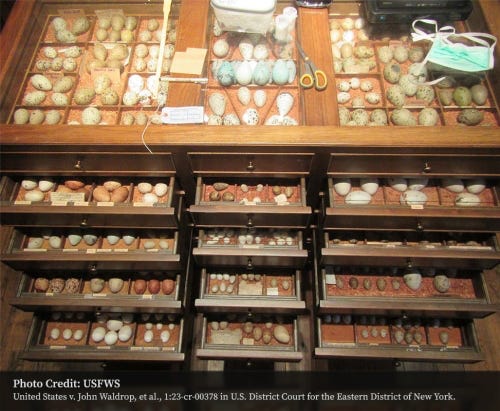The Wild Crime Report for Monday 14 April 2025
Around the world with sharks, eels, birds and geckos.
Welcome to the Wild Crime Report for Monday 14 April 2025.
It’s been a busy week for moi, with a little travel involved, so thus this report just sneaks into the start of the week. Some interesting cases from around the world and across several species types.
So let’s get into some information.
Glass eel traffickers sentenced in France
Glass eels also known as elvers are one of Europe’s most trafficked CITES protected species. A 2023 operation that resulted in the seizure of 300 kilograms of elvers in a Paris warehouse saw two defendants receive 5 years imprisonment. A further four defendants received lesser sentences while two others remain at large.
The case comes off the back of several raids by European law enforcement in the last two years where multiple arrests and seizures of glass eels have thwarted transnational networks aiming to smuggle the precious cargo to Asian buyers. A classic case of a transnational network in operation, the group consisted of French poachers, a French warehouse manager, a transporter in Senegal, Malaysian couriers and a Chinese kingpin.
Massive shark fin seizure in Ecuador
Ecuadorian authorities made a statement last week after police raided a warehouse in the coastal city of Manta and seized 15 tons of shark fins. In a joint operation between the Attorney General’s office and the Ecuadorian National Police, searches were conducted at multiple warehouses where the fins were found to be in various stages of processing, a precursor to the products being bagged up and shipped to the main destination of Hong Kong and China.
The case is particularly significant in Ecuador which has recently had considerable pressure through trade bans from CITES regarding the export of shark fin species. While some of these bans have been adjusted the market demand for fins obviously remains alluring to countries like Ecuador with such significant shark and ray populations.
Record breaking fine in the USA against bird collector
A record breaking fine for a wildlife crime case in the USA was imposed last week against Georgia man, John Waldrop. For a variety of offences in relation to the collection of bird eggs protected by the Bald and Golden Eagle Protection Act, the Migratory Bird Treaty Act and the Endangered Species Act, Waldrop received a fine of $900,000 and three years probation. His co-accused, Toney Jones, also received six month’s probation for his involvement.
The case was investigated by the US Fish and Wildlife Service who uncovered illegal importing spanning 2016 and 2020. Waldrop was identified as a serious collector who had amassed 1,401 taxidermy bird mounts and 2,594 eggs. Bird, bird, bird, the bird is the word.
Geckos seized in north of India
An operation conducted by the Assam Police, in India’s north, saw investigators seize 11 Tokay Geckos and arrest 3 suspects. The operation was conducted with police acting on a tip off and carrying out reported surveillance prior to the bust.
The geckos, which are commonly found in international markets are low prices, are reported to be highly valued within the local market in India and are protected under India’s Wildlife Protection Act 1972.
New laws and policy changes in Hong Kong and China take
Despite the constant attention that the Asian countries receive for their consumer market force for much wildlife and marine crime, as I often try to do, credit should be given when it’s due.
Hong Kong’s Agriculture, Fisheries and Conservation Department (AFCD) reported last week that smuggling of protected species had decreased since 2021 when the country’s Organised and Serious Crime Ordinance was varied to cover wildlife crime offences and allow courts to impose heavier sentences. While changes are one thing, actioning such changes through enforcement is critical, something Hong Kong has repeatedly shown with stiffer sentences for traffickers as well as the addition of money laundering investigations to ‘follow the money.’
The announcement comes at the same time that the Chinese government made a statement by banning pangolin medicine from the upcoming 2025 pharmaceutical guide, Pharmacopoeia of the People's Republic of China. Another small step forward to nip the trade in pangolin scales in the bud. As was seen when China introduced the domestic ivory ban in 2017, hopefully the positive impact of this change trickles down in the coming years.
Stay wild







